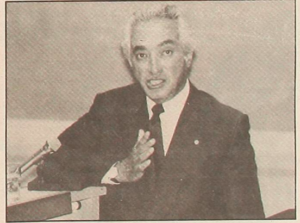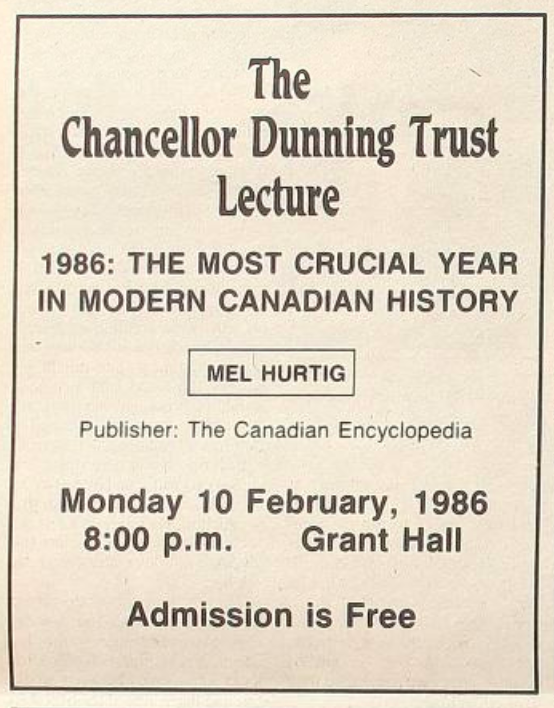
Mel Hurtig was a publisher, an author, and a well-known Canadian nationalist. During the 1972 federal election, he ran as a Liberal in West Edmonton, finishing second. In 1973, he left the Library party and co-founded the Committee for an Independent Canada, which lobbied against foreign ownership and cultural imperialism. In 1985, five years after the demise of the CIC, he founded and chaired the Council of Canadians, an organization dedicated to preserving Canadian economic, political, and cultural sovereignty. He left the Council in 1992, when he was elected leader of the National Party of Canada and led it in the 1993 federal election. In his publishing career, Hurtig produced the Canadian Encyclopedia, which was first released shortly before the lecture in 1985 and constituted the largest publishing project in Canadian history at that point. He was the author of several books, including bestseller The Betrayal of Canada, which examined the effects of NAFTA, The Vanishing Country, about foreign ownership of Canadian companies and resources, and Rushing to Armageddon, a critique of Canada’s participation in the US missile defense system. Hurtig was named Canadian Book Publisher of the Year in both 1975 and 1981. He received the Royal Society of Canada’s Centenary Medal and the Lester B. Pearson Man of the Year Peace Award, and was appointed an Officer of the Order of Canada in 1980. He died in 2016.
In his Dunning Trust lecture, Mel Hurtig addressed proposals for comprehensive free trade between Canada and the United States. He argued that the question of free trade was not about markets, but about the destiny of Canada and its future as an independent nation. The proposed Free Trade Agreement, Hurtig believed, would relocate decision-making power about Canadian lives from Ottawa to DC. From free trade, Hurtig believed it would be hard to stop the momentum carrying North America towards first a customs union, and then a common market, and eventually to the complete annexation of Canada. He predicted that with increasing free trade, Canadians would be forced to abandon the social programs and laws that secured their way of life. He showed particular concern about the requirement under free trade agreements for provinces to surrender power to the federal government, which would increase regional disparities and decrease Canadians’ ability to address them. During his address, he urged Queen’s students to become more politically active and reject the free trade agreement because of its threat to “our ability as Canadians to decide our own future.”
Hurtig’s lecture was held on February 10. Approximately 250 students, faculty, and community members attended.

Listen to Hurtig’s lecture below.